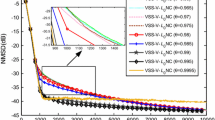Abstract
Partial update (PU) Euclidean direction search (EDS) algorithms have been developed to reduce the computational complexity of the full update EDS. In this paper, the PU EDS is modified to achieve better performance. The performance is analyzed for a time-invariant system and for a time-varying system. Theoretical steady-state mean and mean squared error results of the modified PU EDS are derived for both time-invariant system and time-varying system. Computer simulations are presented to support the theoretical analyses. The modified PU EDS can achieve similar performance to the full update EDS while reducing the computational complexity significantly. The performance of the modified PU EDS is also compared with the PU recursive least squares (RLS) algorithm and the PU conjugate gradient in computer simulations. The performance of modified PU EDS is comparable to PU RLS, and it needs less computational cost.















Similar content being viewed by others
References
Bose, T. (2004) Digital signal and image processing. Wiley, New York
Doğançay, K. (2008) Partial-update adaptive signal processing. Academic Press, Champaign, IL
Naylor, P. A., & Khong, A. W. H. (2004). Affine projection and recursive least squares adaptive filters employing partial updates, in Proceeings of Thirty-Eighth Asilomar Conference on Signal, System & Computers, pp. 950–954.
Khong, A. W. H., & Naylor, P. A. (2007). Selective-tap adaptive filtering with performance analysis for identification of time-varying systems. IEEE Transactions on Audio, Speech, and Language Processing 15(5):1681–1695
Xie, B., & Bose, T. (2011). Partial update conjugate gradient algorithms for adaptive filtering, in Proceeings of PECCS.
Xie, B., & Bose, T. (2011). Tracking performance of the MMax conjugate gradient algorithm, in Proceedings of SDR-WInnComm.
Xie, B., & Bose, T. (2010). Partial update EDS algorithms for adaptive filtering, in Proceedings of ICASSP.
Zhang, Z. K., Bose, T., Xiao, L., & Thamvichai, R. (2006). Performance analysis of the deficient length EDS adaptive algorithms, in Proceedings of APCCAS, pp. 222–226.
Chang, P. S., & Willson, A. N. (2000). Analysis of conjugate gradient algorithms for adaptive filtering. IEEE Transactions on Signal Processing 48(2):409–418
Haykin, S. (2002). Adaptive filter theory, 4th ed. Prentice Hall, New Jersey
Mayyas, K. (2005). Performance analysis of the deficient length LMS adaptive algorithm. IEEE Transactions Signal Processing 53(8):2727–2734
Sayed, A. H. (2003). Fundamentals of adaptive filtering. Wiley, New York
Author information
Authors and Affiliations
Corresponding author
Rights and permissions
About this article
Cite this article
Xie, B., Bose, T. Modified partial update EDS algorithms for adaptive filtering. Analog Integr Circ Sig Process 78, 657–667 (2014). https://doi.org/10.1007/s10470-013-0108-9
Received:
Revised:
Accepted:
Published:
Issue Date:
DOI: https://doi.org/10.1007/s10470-013-0108-9




